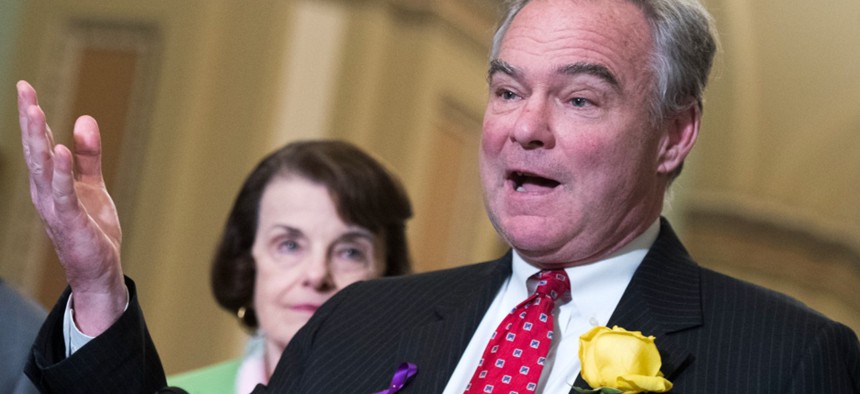
Sens. Tim Kaine, D-Va., right, and Dianne Feinstein, D-Calif., have formally filed an amendment to the annual must-pass defense policy bill that would incorporate the text of the Preventing a Patronage System Act into the legislation. Tom Williams/CQ Roll Call via Getty Images file photo
Senate Democrats Are Pushing to Prevent Another Schedule F, As Part of the Defense Policy Bill
Two senators hope to attach the text of the Preventing a Patronage System Act to the fiscal 2023 National Defense Authorization Act, following the House’s lead.
A pair of Democratic senators on Thursday announced that they are pushing to include legislation aimed at blocking Republican-led efforts to strip tens of thousands of career federal employees of their civil service protections in the fiscal 2023 National Defense Authorization Act.
Sens. Tim Kaine, D-Va., and Dianne Feinstein, D-Calif., have formally filed an amendment to the annual must-pass defense policy bill that would incorporate the text of the Preventing a Patronage System Act into the legislation. That bill, passed by the House earlier this month and introduced in the Senate in August, would block any position in the competitive service from being reclassified into Schedule F, and bars the president from creating new job classifications in the excepted service without first receiving congressional approval.
Schedule F was an ill-fated plan to find and reclassify the positions of tens of thousands of career federal workers in “policy-related” positions outside of the competitive service, stripping them of their civil service protections and making it much easier to hire and fire them. It also allowed agencies to hire new employees to those positions outside of the traditional federal hiring process.
The plan was instituted by former President Trump in October 2020, but it was rescinded shortly after President Biden’s inauguration in January 2021. As a result, no positions were transferred into the new job classification, although a recent report from the Government Accountability Office found that two agencies formally submitted requests to do so, and several others were in the midst of analyzing who might qualify to become part of Schedule F.
Schedule F has been panned by federal employee groups and good government organizations as a tool to politicize the federal civil service, making it easier to remove nonpartisan experts and replace them with partisans willing to implement policies without regard to their legality.
“Congress created the merit system to maintain the expertise-driven delivery of government services,” said Marcus Hill, president of the Senior Executives Association. “While the president sets priorities for the administration, employees are provided protections to ensure their loyalty remains to the law rather than the individual.”
Congressional Democrats renewed their efforts to prevent Schedule F from returning after reports that conservative think tanks have prepared plans to reinstitute the program immediately upon the election of the next Republican president. Trump endorsed the idea of bringing back Schedule F at a rally over the summer. The House version of the National Defense Authorization Act, passed in July, already includes the Preventing a Patronage System Act’s text.
“Our civil service plays an invaluable role in everything from our national security to the administration of Social Security benefits,” Kaine said in a statement. “It’s in Americans’ best interest that those positions be filled with the most qualified applicants. That’s why we are pushing for commonsense safeguards to protect the merit-based hiring system for our federal workforce, and I urge all of my colleagues to join us in this effort.”
“Career federal employees have protections in place to prevent any one administration from firing them and replacing them with political appointees,” Feinstein said. “This is absolutely critical to ensure our government operates effectively. Federal workers fill a range of critical non-political positions ranging from public health to national security to disaster recovery. These positions should remain nonpartisan, independent and based on expertise, and that’s the goal of this amendment.”







